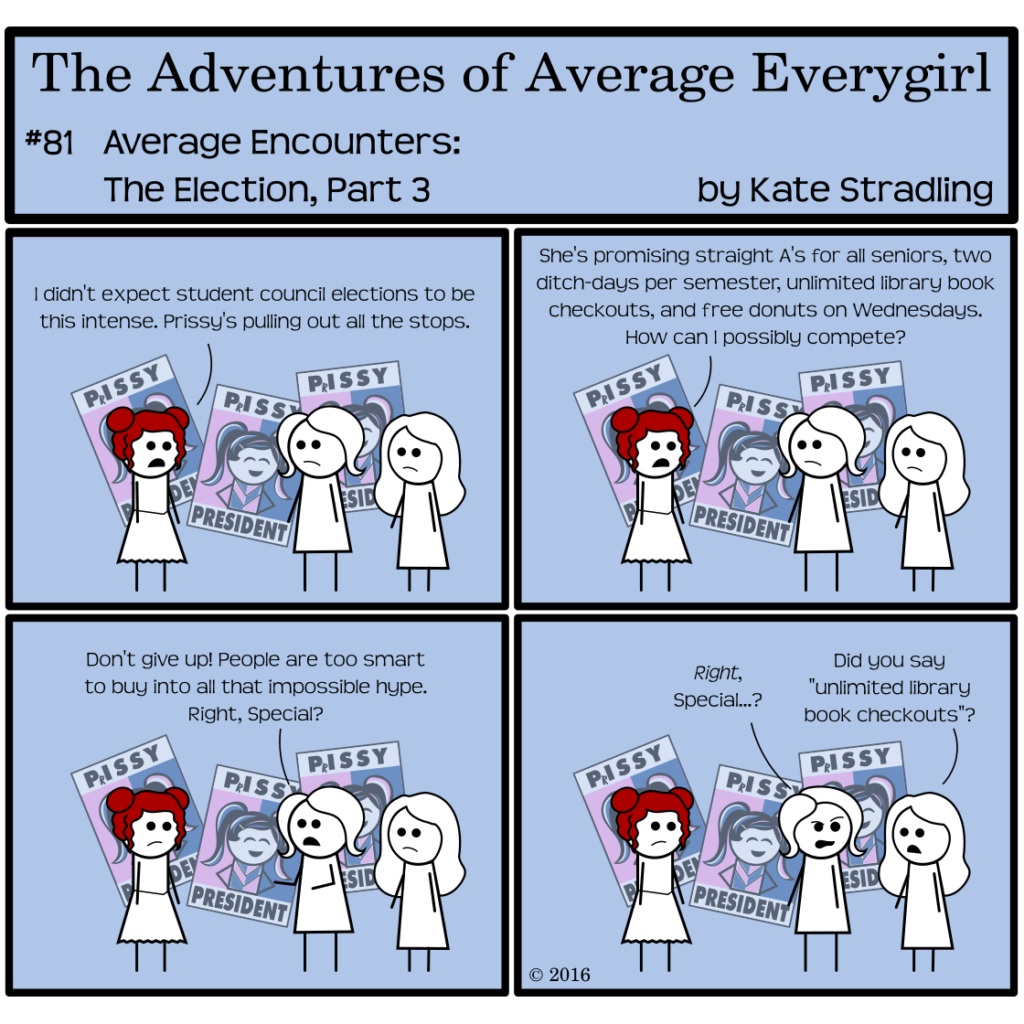
Ah, meaningless rhetoric. When I was in, oh, third grade or thereabouts, one of my cousins, a sixth-grader, ran for student body president of our elementary school. The candidates gave their speeches over the intercom system as all the classes listened, and boy was his a dilly.
My class listened in wonder, oohing and ahhing, murmuring with excitement as he painted the picture of a glorious technicolor world under his auspicious leadership. (Aside: as a reminder, I live in Arizona, where everything is brown under a blue sky. We do lease some greens and oranges on fleeting occasions. /aside)
The only specific line I recall is that he promised us the drinking fountains would flow with root beer instead of water.
Root beer free and on tap is just about the fondest dream of every all-American third-grader. This cousin of mine had the whole school in the palm of his hands.
And I was right there with them, even as a nagging thought in the back of my head asked, “But how would that even work? Where would the root beer come from, and wouldn’t it have to be re-supplied all the time? And what about the mess? Sticky fountains, sticky floors—to say nothing of how often the pipes would have to be cleared and cleaned.”
I suppressed my doubts and, along with my eager classmates, threw my support behind the magnificent promise. (What third-grader really knows how a drinking fountain works? Maybe the water comes from a tank, easily supplied with root beer in its stead.)
My cousin won the election.
We continued to drink water from our drinking fountains thereafter.
And I, a little wiser from the experience, learned never to trust the promises of a politician on the campaign trail.
The Sweet Taste of Empty Rhetoric
Alas, I seem to be in the minority with that lesson. Sometimes, when I look at the political landscape, I feel like an adult in a room full of third-graders:
“People really believe this? Has anyone thought about the logistics involved in delivering that promise?”
No one thinks about logistics if they can possibly help it. We linger in dreams and leave the heavy thinking to the professionals. But honestly, it doesn’t take professional knowledge to realize that root beer in a drinking fountain doesn’t work, so to speak. All you really need is a dose of skepticism and a pinch of common sense.
Which begs the question, again: “People really believe this?”
And I would put to you that, no, many people don’t. Many people, caught up in the rhetoric of what sounds good, know deep down that it’s only rhetoric. They enjoy the rainbow in front of them, dreaming of the pot of gold even while cognizant that in the end, the colors will fade into the ether with nothing of substance left behind.
A Day of Rhetorical Reckoning
For the true believers, the ones with their hearts set on that pot, the ones building their futures around root-beer drinking fountains, a day of reckoning is always around the corner. And when it comes, each inquiring mind will face two possible conclusions:
- “Oh. He was lying all along because it sounded good,” or
- “Those spoil-sport adults must have ruined his amazing plans.”
Rhetoric without substance to back it is empty, the junk food of communication. Some people like junk food. Some people convince themselves it’s nutritious.
And really, it’s futile for the otherwise-informed to fight this trend. We all hear what we want. We choose what to believe based on personal ideals. And sometimes, unfortunately, we support a narrative because it makes us feel good, and not because it holds any logical substance at all.
I’m still at the point where I want to run around to the other third-graders yelling, “He’s not trustworthy! Don’t vote for him! Isn’t there’s SOMEBODY else?”. But my protests would make just as little difference in third grade as they do now. Sigh!
I’m past that point. I feel more like an observer now, offering commentary as the train I’m sitting on derails and thunders into the ditch. At least we live in interesting times, right?
I’ve heard that, while most people don’t really believe the rhetoric they’re being fed, they vote for those whose rhetoric most closely aligns with their own outlook on life. Elementary school children think root beer in the drinking fountains would be cool, so let’s vote for that guy. Or unlimited book checkouts – whatever it is that really speaks to us. If we think it’s important that our candidate is a “family person” or “pro education” or whatever aligns with our personal belief system, we say, let’s vote for that guy.
Yep. It’s a form of branding, where the candidate’s personal life doesn’t even have to match the image created for them. “Anti-establishment” can support and receive support from establishment insiders as long as the rhetoric remains anti-establishment, for example. The captivated audience follows the brand rather than the substance, because they like the way it feels.
Comments are closed.